#Memorable Experiences with the Pathing Tool
Explore tagged Tumblr posts
Text
youtube
Mastering Motion: Quick Tip Tutorial for Animating with the Pathing Tool in Green Screen by DoInk
Dive into the world of dynamic storytelling with our latest tutorial! In this blog post, we'll unveil the secrets of animating with the Pathing Tool in Green Screen by DoInk. Whether you're a teacher bringing lessons to life or a content creator adding a touch of magic to your videos, this quick tip tutorial will empower you to master motion effortlessly.
What you will learn:
Introduction to the Pathing Tool in Green Screen by DoInk
Quick tip tutorial for animating with the Pathing Tool
Exploring the versatility of motion paths in visual storytelling
Tips for seamless integration and customization of animations
Real-world examples for inspiration and application
Elevating your projects with captivating and fluid animations
Animation becomes a breeze with the Pathing Tool in Green Screen by DoInk. Whether you're a beginner or a seasoned creator, this quick tip tutorial will equip you with the skills to infuse life into your projects.
Master the art of animation with the Pathing Tool in Green Screen by DoInk. Share your animated creations with us, and bring stories to life through captivating motion!
#Green Screen by DoInk#Pathing Tool Animation Tutorial#Quick Tip for Dynamic Storytelling#Fluid Motion Paths in Video Editing#DoInk Tutorial for Educators and Content Creators#Elevate Your Projects with Animated Elements#Creative Applications of Motion Paths#Customization Options for Personalized Animations#Memorable Experiences with the Pathing Tool#Mastering Motion in Green Screen by DoInk#DoInk#Do Ink#How to animate in DoInk#How to use DoInk#Best App for Students#Youtube
1 note
·
View note
Text
Speed of Science🧬💻💌
I'm dating a STEM girlie and you're not (F1 Edition)



a/n: and im baaaaaacccckkkkk (like anyone even missed me lmao) with the long overdue request! life of a postgrad StEm girlie here and the struggle is really realll af. but besides that, I'm writing this down as a headcanon for the drivers requested on this poll i had posted long back here. I've always wondered how there's soo minimal povs/ocs where they are a scientific researcher, analyst, etc. sooo i dedicate this one to all the STEM F1 girlies out theree <33
alsoo quick shoutout to my girlieee @smoooothoperator for inspiring and motivating me to get back at writing!🥹🫶🏼 check out her lastest ongoing work 'What Was I Made For? ' its amazing and thats a FACT!! do check her works! its absolutely amazing❤️
check out my works: until i found you masterlist | other works

Scientific Art Illustrator - Charles Leclerc
As a Scientific Art Illustrator, you specialize in creating visually captivating and scientifically accurate illustrations that depict complex biological, astronomical, or technological subjects.
Charles first discovered you through your works at an exhibition where their stunning illustrations of Formula 1 cars caught his eye. Impressed by their attention to detail and artistic talent, they struck up a conversation about their mutual love for precision and creativity.
During a peaceful weekend afternoon, Charles suggests a spontaneous visit to a local art supply store. Excitedly exploring aisles stocked with vibrant paints, fine brushes, and specialized papers, the two of you engage in discussions about artistic techniques and innovative tools. Amidst laughter and shared enthusiasm for creativity, you bond over your mutual appreciation for the intricacies of art and science, making the afternoon a cherished memory of their shared passions.
After being away from home during race season, Charles always finds a framed series of sketches by you for the races you couldn't make it, capturing his most memorable racing moments. Each sketch is intricately detailed, depicting not only the speed and intensity of the races but also the emotions and determination etched on Charles' face. Touched by the thoughtful gesture, Charles hangs the sketches in his study, a constant reminder of your support and admiration for his passion.
...

Data Scientist - Lando Norris
A Data Scientist specializes in analyzing large volumes of data using statistical methods and machine learning techniques to extract insights and make data-driven decisions.
You and Lando first connected through a mutual fascination with racing data at a technology symposium focused on sports analytics. Your presentation on advanced predictive modelling in motorsports caught Lando's attention for its innovative approach to enhancing race strategies.
During a cosy evening at home, Lando playfully challenges you to a friendly data analysis competition using real-time telemetry from previous races. Their banter and shared excitement over dissecting racing data create a lighthearted and memorable bonding experience.
You two would watch old races and analyze historical racing data together, playfully debating optimal pit stop strategies and analyzing driver performance trends, their shared passion for racing and data fostering a deep connection and mutual admiration.
...

Oceanographer/Marine Biologist - Oscar Piastri
An Oceanographer or Marine Biologist studies marine life, ecosystems, and ocean processes to understand and protect marine environments and resources.
You and Oscar crossed paths during a research expedition to study coral reefs in a remote location. Your expertise in marine biology and passion for conservation impressed Oscar, sparking their connection.
Amidst the hectic F1 season, Oscar surprises you with a weekend getaway to a coastal retreat, where they explore tide pools and participate in a beach cleanup together, reaffirming their commitment to environmental stewardship.
You gave Oscar a custom-made charm bracelet featuring miniature charms of marine animals they've discussed during their beach walks and conservation talks. Each charm represents a meaningful moment in their relationship, from their first discussion about oceanography to their shared admiration for marine life. Oscar wears the bracelet during race weekends as a reminder of you and all the love and support you give, both on and off the track.
...

Mechanical Engineer - Daniel Riccardo
You are a passionate Mechanical Engineer, specializing in advanced automotive design and performance optimization.
Daniel first encountered you at a technical conference organized by one of the team sponsors where you presented groundbreaking research on aerodynamic innovations that caught his attention.
Often, while you meticulously draft engineering schematics at their home office, he makes sure that you have your "engineering emergency kit" beside your workstation, which is a tray of snacks and their favourite coffee – ensuring they're fueled for their late-night brainstorming sessions. For when he's away for races, he stacks them up with small cute notes.
Before Daniel heads to a crucial race, you surprise him with a meticulously crafted miniature replica of his race car, complete with detailed decals and a personalized message of encouragement engraved on the base. Touched by the thoughtful gesture, Daniel proudly displays it in his motorhome, a reminder of the reader's unwavering support both on and off the track.
...

Statistician - George Russell
A Statistician specializes in collecting, analyzing, and interpreting numerical data to help organizations and individuals make informed decisions.
You and Russell first crossed paths during a university seminar on advanced statistical modeling in sports. Your insightful analysis of Formula 1 race data caught George's attention, sparking a lively discussion that led to mutual admiration for each other's analytical skills and shared passion for racing statistics.
During a particularly demanding race weekend, the reader surprises George with a meticulously prepared statistical analysis report highlighting his strengths and areas for improvement based on recent race data. This thoughtful gesture boosts George's confidence and motivation, showing the reader's support in his pursuit of excellence.
During a weekend getaway, you guys stumble upon a local go-kart track. George, always up for a challenge, suggests they have a friendly race. Knowing George's competitive spirit, you secretly calculate his optimal strategy and surprise him by winning with a perfectly executed last-minute overtaking maneuver. George is impressed by the your strategic thinking and playfulness, and they share a lighthearted and joyous moment celebrating their shared love for racing and friendly competition.
...

Astrophysicist - Logan Sargeant
An Astrophysicist studies the physical properties, behavior, and evolution of celestial objects such as stars, planets, galaxies, and the universe as a whole, using principles of physics and astronomy.
Logan and you first crossed paths during an expedition to study a rare astronomical event—a comet passing close to Earth. Both passionate about astrophysics, you found yourselves sharing a telescope at a remote observatory, marveling at the comet's beauty and discussing its celestial significance late into the night. Their shared awe and intellectual connection sparked a mutual admiration that grew into a deep bond over their shared passion for exploring the wonders of the cosmos.
During a quiet evening at home, Logan excitedly shows you a new telescope he acquired for stargazing during race weekends, expressing his eagerness to learn more about the cosmos together and sharing their enthusiasm for both racing and astrophysics in equal measure.
Before a critical race weekend, the reader surprises Logan with a personalized star chart that maps out the night sky above the upcoming race venue during the race weekend. Each star on the chart is marked with a heartfelt message of encouragement, reminding Logan of their unwavering support and belief in his abilities on and off the track. Touched by the thoughtful gesture, Logan treasures the star chart as a symbol of the reader's love and encouragement throughout his racing career.
...

Climate Scientist - Lance Stroll
A Climate Scientist studies climate patterns, environmental changes, and their impacts on Earth's ecosystems, using data analysis and modeling to understand and address global climate challenges.
Lance crossed paths with you at an eco-friendly racing event where Lance was advocating for sustainable practices in motorsport. Being a respected climate scientist, you caught Lance's attention with your insightful presentation on the environmental impact of racing and innovative solutions for reducing carbon footprints in the sport. Their shared passion for sustainability sparked an immediate connection and admiration for each other's dedication to making a positive impact on the environment.
One weekend, Lance surprises you with a homemade dinner featuring sustainably sourced ingredients, proudly showcasing his culinary skills while discussing ways to reduce your carbon footprint. His earnest commitment to sustainability and your shared vision for a healthier planet melts your heart, making this a cherished moment you both treasure.
You, being deeply involved in climate science, often spends late nights analyzing data or writing research papers. One evening, Lance bring him a cozy blanket and a mug of your favorite hot beverage, quietly sitting beside him as he works. You look up from your laptop, touched by his thoughtfulness, and pulls him into a warm embrace, grateful for his unwavering support and understanding of your demanding but vital work.
...
taglist: @lndonrris @thatgirlmj @lwstuff @dannyramirezwife-f1dump @moonypixel tysm for your suggestions! apologies on taking this long to write😅🫶🏼
a/n: hope y'all enjoyed reading this! this was my first time writing a headcanon and for f1 drivers beside charles and lando so hope i did justice to all.
i'm being wanting to read some good domestic bliss, sweet, adorable and lovey dovey blurbs, fics of lando (i talked abt it here) soo maybe i'll work on some drafts at some point cause i'm currently in the middle of project work of my masters degree soo don't know when i'll be posting soo until next time, see yaaa and going back to read mode 👋💓✨️
check out my works: until i found you masterlist | other works
#f1 x reader#f1 headcanons#charles leclerc#charles leclerc x reader#lando norris#lando norris x reader#oscar piastri#oscar piastri x reader#daniel ricciardo#daniel ricciardo x reader#george russell#george russel x reader#logan sargeant#logan sargent x reader#lance stroll#lance stroll x reader#f1 driver x you#f1 driver x reader#formula one
321 notes
·
View notes
Text
"Why do you like Starbreaker?"
me, internally: The themes introduced by Porter's godhood and Jace's servitude toward him are genuinely interesting. So much of Junior Year concerns itself w/ fairness n personal autonomy n devotion n worship n making your own meaning. The idea that Jace and Porter "have always been a duo" n the fact that Brennan has been holding onto this reveal since SY means that Jace was retooled to exist FOR porter. Porter's quest for godhood eclipses anything else that could have mattered about jace, his purpose becomes serving Porter on both a textual n meta level. On both levels he is contorted into someone alien to himself. Even though he is a character with few lines, Jace's voice in freshman year compared to Junior year feels distinct, he sounds younger, he sounds like he's looking for connection, he honestly sounds like a pretty recent hire, and in that context is it not pitiable what happened to him? Does that not make him similar to Sandra Lynn, a young person who was exploited by someone older than her and who uses religion as a tool for control? And yet the tone over and over again treats him with ambivalence in a world that is obsessed with fair. The text over and over again wants to reiterate this idea of characters getting to make their own meaning, but what does it mean to be a sequel to someone else? To be a footnote in their vision? Jace's life is a decision a GM made, he is Porter's sequel on a textual and meta level. He is continually denied interiority within the text (perfect example is sophmore year where teachers are not allowed to be hirelings when Jace is proposed than an immediate workaround is made for Gilear to come with the Bad kids). He never had a choice but to be a follower to the god of war because the other option was deathly silence, a prop or a martyr like Lucy or Yolanda. Is being remembered fondly and uncomplicatedly despite your flaws but being deathly silent better than being corrupted? The question of Jace's motivation is continually left unanswered n in that, part of the Starbreaker thought experiment is wondering how exactly Jace slots into this Plan, into Porter's life. He could simply be a lackey, sure, but is being forced to be a lackey for a god not in a way its own form of worship? To imagine Jace's subservience to Porter as a kind of love, a kind of toxic old man yaoi if you will, is maybe a way to play at a world where he gets a sense of purpose, or some kind of love in return, even if that life is fucked n compromised n broken, because he was asked "do you want this life" n he said yes. What does it mean to be a person who is contorted into villainy without a choice when the very undercurrent of your world is telling everyone else "there's always a choice!"? When the text condemns you for evil if you only ever can exist as a tool? Before Porter became Jace's world, he was practically egoless, no matter what tone his dialogue takes on. Every scene he's in, he's w/e the situation demanded of him, taking up no oxygen in the room w/out even a memorable gimmick to make him distinct n funny. Pure function. It wasn't a big life but it was his. Was wanting to live, being content to be a footnote to the Bad Kids the sin that condemned Jace stardiamond? Or was wanting to live even if he no longer was recognizable to himself the sin that condemned him? Or is it the fact that he enables cruelty, and is that fair when characters who are horrible in their own ways get a pass as long as they are fun and funny and memorable? Is his life better now that he is more of a presence in his cruel and twisted but albeit slightly more memorable state, if his life now condemns him to be hated forever? Does Jace get power from his deal with Porter? Is getting a time in the spotlight of the narrative its own form of power? Is Jace happy serving Porter? Would Jace be happy loving Porter? Did Porter give jace new life by destroying the old jace, by making sure all paths lead straight back to him? Is Starbreaker just our way of trying to say imagine Jace Stardiamond happy?
what I say: haha idk toxic co workers fucking is hot
58 notes
·
View notes
Text
I decided to share some of my thoughts on Kimblee’s hypothetical childhood and youth. As usual, my stream of consciousness is a jumbled mess and reads terribly. I have zero knack for writing, which is why I reworked my original text using AI to make it actually readable instead of forcing people to decipher my scribbles ._.
This might not be the final version—I may update or tweak it over time.
Family and Early Years
Kimblee was born into a wealthy aristocratic family where status and tradition outweighed emotional bonds.
Mother: A descendant of renowned musicians and composers. She tried to instill in him a love for art but faced his cold curiosity. Her attempts to teach compassion shattered when young Solf gifted her a dead songbird, genuinely bewildered by her horror.
Father: Heir to a family of scholars and soldiers who chose business. He taught Solf hunting as a metaphor for power. Lessons in skinning prey and survival became the boy’s first experiments in studying life through death.
Personality Formation: Psychopathy vs. Upbringing
From childhood, Solf stood apart. His innate psychopathy was not born of trauma but flourished under his environment:
Scientific Curiosity: The world was his laboratory, people his test subjects. Dismantling mechanisms, testing boundaries, and bending rules became his way of understanding existence.
Master of Mimicry: Realizing his nature would be rejected, he learned to feign "normalcy" to secure resources for his pursuits.
Turning Points: — Father’s Death on a Hunt: Cemented his belief that even the strong are fragile. At the funeral, he observed grief as a social ritual. — Mother’s Withdrawal: After failing to "fix" him, she handed his upbringing to his grandparents, unable to accept his true self.
Adolescence: Alchemy, Discipline, and Rebellion
Under the strict oversight of his military grandfather and educator grandmother, Kimblee faced new trials:
Military Rigor: Beatings and discipline didn’t break him but taught endurance and deception.
First Explosions: His interest in alchemy ignited after experimenting with fishing explosives. Destroying a shed and injuring a worker gave him an aesthetic revelation: "Chaos is a symphony I’d never heard before."
Underground Fights: He joined fistfights for adrenaline and money, hiding bruises with makeup to perfect his lies.
Becoming the Crimson Lotus Alchemist
Education: Private alchemy tutors hired by his family quickly recognized his genius. He saw transmutation not as science but as art—a way to reshape reality.
Military Academy: His grandfather sent him there to instill discipline, but for Kimblee, it became a testing ground for human nature under pressure.
Grandfather’s Death: He dismissed the old man’s heart attack as a "pathetic end," reinforcing his belief that weakness deserved no place in life.
Family Paradoxes
Each relative "loved" him in their own way, yet none accepted his true nature:
Grandmother: Proud of his title as a State Alchemist, she never understood his path of destruction. Even after his imprisonment, she didn’t disown him—he remained the family heir.
Father: Left him not a business but a philosophy: "Respect your prey, but never pity it." Later, Kimblee transformed this into collecting the faces of his victims.
Headcanons: Character-Defining Details
Trophies: After hunts with his father, he began keeping mementos of prey—later evolving into memorizing the faces of the slain.
Musical Ear: Inherited from his mother, he used it not for classic art but to detect fear in voices. Аnd later to improve the sound quality of his explosions.
Cosmetics: In youth, he hid bruises from fights; later, scars from experiments.
Conclusion Kimblee didn’t become a monster because of his family—he was born one. His environment provided tools but didn’t dictate his path. Parents, grandparents, and tutors tried to mold him into a "worthy man," yet only honed his innate essence. He is no victim of circumstance but a conscious architect of chaos, proving evil can be refined when embraced as art.
#kimblee#solf j. kimblee#solfjkimblee#My interpretation#I get a little nervous putting my thoughts out there like that.
7 notes
·
View notes
Text
Lost Records: Bloom & Rage

Damaged Memory
*handycam start-up noise* Alright, we're rolling. Hi, I’m Lola. and hum, I’ve been into writing reviews lately, I mean, I kinda enjoy it. I grew up in the 90s, so yeah, I get a little nostalgic for that era sometimes. And so you see, I came across this game; Lost Records. And it happens to be set in that period. Plus, it’s a narrative game. I like narrative games, you know? Anyway. I'm going to give my opinion on it, that's the point of this recording, right? So… will this be the right take?
❤ Lost Records is first and foremost a game about timeless friendships, seen through the eyes of its four heroines. Reminiscent of Stand by Me, we follow a group of somewhat marginal teenage girls who find and understand each other, forming a strong and unbreakable bond. The game takes the time to create and develop this very touching bond between them, whether platonic or not, to the point where we couldn't even imagine the group without one of them. Their energies intertwine in a unique chemistry, and we end up feeling close to them ourselves, like a silent shadow accompanying them through their unforgettable summer. Besides, I suspect that Abyss represents the player, as a 5th member of the group, helping them to gain their freedom through our choices. So, when we return to the present, we almost feel a certain bitterness at seeing them like this, growing old and trying to pick up the pieces of their past. And the game truly understands the impact of this friendship because, in the end, every branching path is entirely dependent on the relationships between the girls based on our interactions. As a result, we feel each bond even more… as well as each heartbreak. ❤ It's beautiful... like, really. The attention to detail is impressive; the textures of the skin with its imperfections, the reflection in the characters' eyes, the light filtering through the foliage, the reflections of the water… The game even offers contemplation spots and it’s right to let us enjoy them. And not only is it stunning, but it’s also deeply nostalgic: we’re fully immersed in that 90s vibe. Between all the little objects and toys of the era, the retro decor, and the clothing, the game will appeal to the sensibilities of the older generation, or immerse the younger ones in this singular period. We’d love to capture it, to keep a piece of it. ❤ Good thing we have a camera for that. We can immortalize life’s moments to fill up our summer memory, like collectibles waiting to be discovered. And even better, we can choose and edit our videos to to fine-tune the final result. We start looking for the best angles, the right timing, zooming in, zooming out… And sometimes, we film just for the pure pleasure of it, like freezing a moment in time. The camera becomes more than just a gadget, but a true tool of self-expression. ❤ There’s no denying it, Don't Nod knows how to choose its soundtrack. Between chill and atmospheric tracks, electro layers with a mysterious vibe that remind you a bit of Stranger Things, and that one rock song with a very memorable adolescent energy, everything is in place to immerse us in the mood. The music accompanies every scene and even helps reinforce the nostalgic memories we’ll take away from the game.
youtube
+/- As with any Don't Nod game, the player participates in the story’s progression, whether through dialogue choices or certain actions. This makes the experience more personal, and each playthrough unique if you want to relive it. But, here’s the thing, many of the choices felt rather superficial to me. Sure, they mostly influence the relationships formed between the characters, which is at the heart of the game. But overall, the game doesn’t feel very different, and I would have liked more distinct paths and a stronger sense of the weight of my decisions.
✖ There's a real pacing issue between Tape 1 and Tape 2. The first takes its time, maybe a little too much, to set the mood and build the bonds between our characters... while the second part seems to rush through everything. The story hurries, not giving enough time to clarify certain mysteries, especially around the Abyss, where we would have liked to have more clues to decipher it. As a result, the final promise becomes extremely confusing, and we don’t really understand its stakes, which leads to several plot inconsistencies. As for the protagonists, their actions become almost incoherent due to the abrupt changes in their behavior. Take Corey, for example, who, by the end of Part 1, seemed like a more nuanced antagonist than he initially appeared… In the end, he becomes nothing more than a caricature and completely loses credibility in his development. ✖ The management of dialogue lines also slows down the gameplay even further. It’s very common for lines to overlap, especially when a dialogue is triggered while we’re exploring and interacting with objects. As a result, either it abruptly interrupts the ongoing dialogue, or both play at the same time. We then find ourselves stupidly waiting for the character to finish speaking before we can continue doing anything. And since the game already assumes a slow pace, which doesn't bother me in itself, these repeated interruptions end up weighing down the progression. ✖ It’s also hard not to mention the numerous technical bugs; game crashes, filmed videos disappearing on their own during editing, questionable synchronization between dialogue lines and character movements… For a studio like Don't Nod, we would have expected more polish for the game's release.
Well… I can't help but feel affection for this game, because it inevitably takes me back to my own childhood memories and knows exactly where to push to hit the right spot. Its story? I’ll probably forget it pretty quickly; not well-crafted enough and lacking subtlety in its second half. I’ve enjoyed sticking with this little group to the finish… and now, looks like my own tape is about to end too. So... cut!
youtube
➡ My Steam page
#lost records bloom and rage#lost records#don't nod narrative didn't strike me since LIS2 really......#still enjoyable but like it feels something is missing each time#anyway - I love those girls SO BAD#Lola plays games#personal
7 notes
·
View notes
Text
I am
1. Bored
2. Procrastinating
3. A One Piece simp
So instead of doing something productive I wrote an essay on One Piece instead, especially on Law, Doflamingo, and Corazon. Oops
This trio exemplifies how individuals, despite sharing backgrounds or experiences, can chart vastly different paths based on personal choices and influences.
Doflamingo's reaction to trauma is rooted in anger, entitlement, and a desire for power. The loss of his status as a World Noble and the subsequent persecution by the public deeply wounded him. He internalized this hatred and developed a warped worldview. He believed in a "natural order" where the strong dominate and the weak suffer. His traumas justified, in his mind, a life of crime, manipulation, and conquest. It's the notion of "I suffered, so it's only fair that others suffer too."
What I think is scary is how incredibly charming Doflamingo is. Doflamingo's charm and eloquence aren't just tools for manipulation but are integral to his persona. He's incredibly self-assured and possesses an innate ability to captivate and influence those around him, whether it's his own crew, enemies, or even the audience.
One of the most memorable examples of this is his speech during the Dressrosa arc about the "Justice" of the world. He speaks of a world that's on the brink, where the definitions of right and wrong are arbitrary, determined by the victors. While there's truth in his words, Doflamingo uses this perspective not as a call for change or introspection but to justify his own heinous actions. He presents himself as a realist, someone who understands the world's inherent chaos, and therefore, in this chaotic world, his actions are just another form of "justice."
By delving into his past, Oda allows us to understand the roots of Doflamingo's twisted worldview. We see a child who was traumatized, ridiculed, and hunted, and it's only natural to feel sympathy for him. However, where Oda's storytelling brilliance truly shines is in how he balances this empathy with the stark reality of Doflamingo's present actions. We're reminded that while trauma can explain certain behaviors, it doesn't excuse them.
Doflamingo's habit of recruiting and manipulating children into his ranks is one of the most sinister facets of his character. It shows a deeply predatory nature.
Children, due to their impressionable nature, can be more easily molded to fit specific ideologies or behaviors. By taking in children who have faced traumas or have been abandoned, Doflamingo offers them a twisted form of "salvation" where they owe him loyalty for providing them with purpose and a sense of belonging. This indebtedness ensures that they grow up internalizing his values and becoming staunchly loyal members of the Donquixote Family.
Law's backstory is an example of this. After the tragedy of Flevance, Law was consumed by despair and a desire for revenge. Doflamingo recognized the potential in this broken child and took him in, not out of compassion, but to mold him into a weapon for his own use. Similarly, Baby 5's inclination to feel needed and useful was exploited by Doflamingo, ensuring her unwavering loyalty to him.
On the other hand, Corazon took a path of empathy and compassion. Despite experiencing the same traumas as Doflamingo, he came to regret the sins of their lineage and wanted to prevent further pain and suffering. His choice to join the Marines covertly and to act against his brother's ambitions is a testament to his desire to rectify wrongs and shield others from experiencing the pain he went through.
His relationship with Law exemplifies this. Corazon's love for Law is unconditional and selfless. From the moment he realizes the depth of Law's trauma and pain, Corazon goes to extraordinary lengths to protect and save him, even at great risk to himself. He provides Law with something the boy had never truly experienced since the tragedy of Flevance: genuine affection without any strings attached. Corazon doesn't see Law as a tool or a weapon, but as a hurt child in need of love and healing. His efforts to procure the Ope Ope no Mi for Law's sake, and his ultimate sacrifice, are testaments to the depth of his love. It's the principle of "I've been hurt, and I don't want others to go through the same pain."
In Dressrosa, when Sengoku said to Law, "Don't try to find a reason for somebody's love" it really broke me. Law's life was marked by tragedy and pain, leading him to question the inherent goodness in people and the world. His interactions with Doflamingo further cemented his belief that bonds are rooted in personal gain or ulterior motives. So, when confronted with Corazon's unwavering love and eventual sacrifice, Law struggles to understand. Why would someone go on such lengths for him? What was Corazon's motive?
Sengoku's words to Law serve as a powerful reminder that true love, whether familial, romantic, or platonic, doesn't always have a rationale or ulterior motive. Sometimes, people love and care simply because they do.
I know it's cheesy as feck but for me the relationship between Corazon and Law is a poignant representation of how genuine love and care can transform a person's life, especially when juxtaposed against the backdrop of a world filled with betrayal, power struggles, and cruelty. This selfless love becomes a beacon of hope for Law. Corazon's actions teach him that the world isn't just about pain and betrayal; there are pockets of genuine affection and goodness. The very fact that Law named his crew The Heart Pirates and incorporates it into his own pirate flag speaks volumes about the impact of their bond.
However, that's not to say that Law is like, completely healed. His character isn't given a simplistic "redemption arc" where past traumas are quickly forgotten or overridden by newfound relationships. Instead, Law's healing is gradual, nuanced, and fraught with challenges. Law's strategic and sometimes ruthless approach to situations carries the mark of Doflamingo's teachings. While he isn't as cruel as Doflamingo, Law's willingness to make tough decisions and sacrifices can be traced back to the survival instincts honed under Doflamingo's rule. Also, Law's initial reluctance to trust others and form close bonds, like with the Straw Hat crew, can be attributed to his early experiences with betrayal.
Also, for a significant portion of the series, Law's primary motivation was to enact revenge on Doflamingo for the pain he caused him and for Corazon's death. This drive influenced many of Law's actions and decisions. Being under Doflamingo, Law learned the importance of power and influence in the pirate world. This understanding can be seen in Law's approach to alliances and his understanding of the New World's dynamics.
I think this is one of the reason why im so drawn to One Piece. It shows that Law's pain and trauma won't just willy nilly be instantly healed by Corazon. It shows that the impact of trauma is everlasting. One Piece might be set in a fantastical world filled with unique powers and grand adventures, the emotional core of the story remains grounded and human.
Anyway imma go cry now

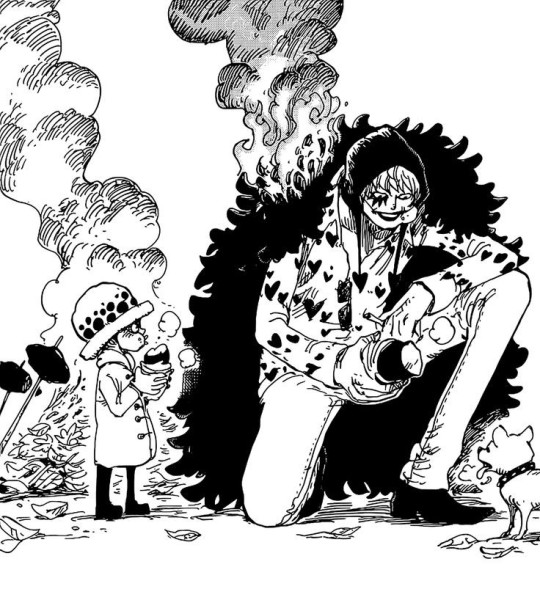
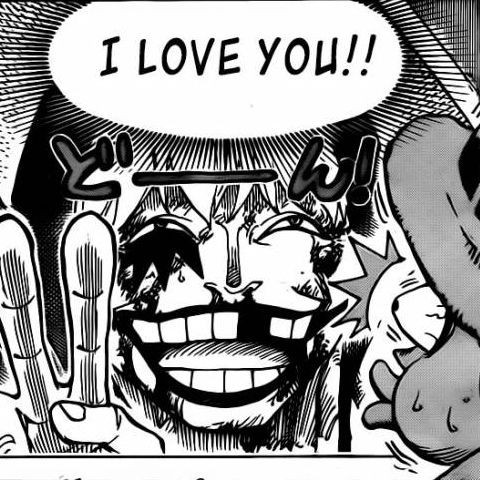
#one piece#corazon#law#trafalgar law#donquixote doflamingo#op doflamingo#donquixote rosinante#heart pirates#monkey d. luffy#dressrosa#one piece live action
94 notes
·
View notes
Text
Power of Repetition in Public Speaking
After watching "Oscar-winning actor & writer Tom Hanks gives the Oxford Union an acting lesson" on YouTube I felt inspired to write this blog. The link below if interested.
youtube
Public speaking is an art that transcends mere words; it involves a deep understanding of human psychology, effective communication techniques, and the strategic use of rhetorical devices. Among these, repetition stands out as a powerful tool that can elevate a speech from ordinary to extraordinary. In this blog, we delve into the Repetition class in speaking, exploring how this technique can captivate audiences, enhance message retention, and leave a lasting impact.
The Basics of Repetition:
Repetition involves the intentional reuse of words, phrases, or ideas within a speech. When employed thoughtfully, it can create emphasis, reinforce key points, and establish a rhythm that resonates with the audience. There are various forms of repetition, each serving a unique purpose:
Anaphora: This involves repeating the same word or phrase at the beginning of successive clauses or sentences. For example, Martin Luther King Jr.'s iconic "I Have a Dream" speech masterfully uses anaphora with the repetition of "I have a dream."
Epistrophe: In contrast to anaphora, epistrophe repeats a word or phrase at the end of successive clauses or sentences. Winston Churchill's famous "We shall fight on the beaches" speech is a classic example of epistrophe in action.
Anadiplosis: This technique involves repeating the last word of one clause or sentence at the beginning of the next. This creates a seamless connection between ideas and builds momentum. Yoda's sage advice, "Fear is the path to the dark side. Fear leads to anger, anger leads to hate, hate leads to suffering," is an example of anadiplosis.
The Impact of Repetition:
Emphasis: Repetition serves as a spotlight, directing the audience's attention to specific words or ideas. By repeating a key point, a speaker can emphasize its importance, making it more likely to be remembered.
Rhythm and Flow: A well-crafted repetition adds a musical quality to a speech, creating a rhythmic flow that engages the audience. This cadence can make the message more memorable and enjoyable.
Connection: Repetition helps to establish connections between different parts of a speech. It ties ideas together, creating a cohesive narrative that is easier for the audience to follow.
Persuasion: Through repetition, a speaker can subtly persuade the audience to adopt a particular viewpoint or take action. The consistent reinforcement of a message can influence attitudes and beliefs.
Practical Tips for Using Repetition Effectively:
Choose Key Points: Identify the core messages you want to convey, and strategically repeat key words or phrases associated with these points.
Consider Your Audience: Tailor your repetition to resonate with your audience. Understanding their preferences, values, and expectations will help you use repetition more effectively.
Vary Your Approach: While repetition is a powerful tool, overusing it can diminish its impact. Vary your repetition techniques to keep the audience engaged and interested.
Practice Pacing: The timing and pacing of repetition are crucial. Practice delivering your speech with the right rhythm to maximize its impact.
In the world of public speaking, the Repetition class is a formidable ally. When wielded with skill and precision, repetition can transform a speech into a compelling, memorable experience for both the speaker and the audience. By understanding the various forms of repetition and practising its implementation, speakers can elevate their communication skills and leave a lasting impression on those who listen.
#Public Speaking#Rhetorical Devices#Repetition Techniques#Speechwriting#Effective Communication#Persuasive Speaking#Anaphora#Epistrophe#Anadiplosis#Key Points#Audience Engagement#Message Retention#Speech Delivery#Communication Skills#Oratory#Eloquence#Presentation Techniques#Audience Connection#Speech Structure#Rhythm and Flow#Tom Hanks#Oxford Union#Acting Lesson#Academy Award Winner#Celebrity Appearance#Hollywood Icon#Acting Techniques#Film Industry#Writing#Performance Skills
20 notes
·
View notes
Text
Essential Guide for Safe and Enjoyable SM: Precautions During Domination
SM can be an activity that offers a special bond and pleasure when based on mutual consent. However, to ensure a safe and positive experience, several important principles must be strictly followed. Especially, the "dom" (dominating) side must prioritize the submissive partner's safety and psychological state.
This post provides key precautions and tips for safe and enjoyable SM play.
1. The Dominating Side Must Always Prioritize 'Safety'.
SM play can always involve risks. Therefore, the person in the "dominating" role, who leads the play, must constantly check and be considerate of the submissive partner's safety.
The most crucial thing is to clearly understand the submissive partner's current state. Ask yourself the following questions:
Is the submissive partner not in a dangerous state?
Is the submissive partner genuinely not wanting this?
These two points are minimum safety measures and must be checked before and during the play. Neglecting them can cause deep harm to the submissive partner and might prevent any future SM relationships.
During SM, the submissive partner might show signs of resistance. At this point, it's crucial to clearly distinguish whether this is "part of the play" or if they are "genuinely not wanting this." If it seems the submissive partner is truly unwilling, the play must be stopped immediately.
Furthermore, never proceed with play if the submissive partner is not feeling well. Also, pay strict attention to the hygiene management of any tools or equipment used for domination. Safe and hygienic play is fundamental to an enjoyable SM experience.
2. Key Points to Pay Special Attention to During Domination Play
To ensure safe and enjoyable SM, please remember these three key points:
① Play while confirming the submissive partner's situation.
Excessive domination can put the submissive partner at risk. Clearly recognize their condition, psychological state, and limits, and play within that scope. No play should be initiated without the submissive partner's consent.
② Never do anything the submissive partner genuinely dislikes.
If the submissive partner genuinely dislikes a specific act, you must stop the play immediately without hesitation. Continuing to do so will leave deep trauma for the submissive partner and could create strong aversion to SM itself. This is a direct path to destroying the relationship.
③ Always consider safety and hygiene during play.
SM should be an activity where both parties experience positive and enjoyable emotions. Therefore, neglecting safety or engaging in overly forceful play should be absolutely avoided. Psychological safety is as important as physical safety. Additionally, neglecting hygiene can increase the risk of sexually transmitted infections (STIs), so the cleanliness of all tools and the environment must be rigorously maintained.
SM offers the greatest satisfaction when built on trust and respect. Prioritize your partner's safety, consent, and well-being, and strive to create a memorable and positive experience for both of you.
30s male Dom based in Republic of Korea Seoul, Gyeonggi, or Gangwon.
For Subs seeking a spark in their mundane life, or anyone curious about SM, don't hesitate to connect.
Line: payitoff
2 notes
·
View notes
Text
Making Wise Decisions for Every Trekker to Stay Prepared in the Outdoors

Being in nature brings unmatched peace and adventure, but preparation is essential for making the most of it. Having the right tools, clothing, and gear not only keeps you safe but also makes your outdoor time enjoyable. From shelter to footwear, every item matters. Let's take a closer look at the smart choices for outdoor enthusiasts, including the Best Outdoor Equipment by Himmaleh, sturdy Camping Tent by Himmaleh, and dependable Waterproof Trekking Shoes by Himmaleh.
Footwear That Supports You All the Way
Anyone who has spent time on the trail knows how important footwear is. The right pair protects your feet from harsh terrain and helps prevent fatigue. Waterproof Trekking Shoes by Himmaleh are built to handle various outdoor conditions. These shoes are water-resistant, giving you confidence even in wet environments.
The soles grip rough surfaces, reducing the chance of slipping. At the same time, they’re breathable enough for comfort during long hikes. Whether you’re tackling muddy forest paths or steep mountain trails, Waterproof Trekking Shoes by Himmaleh are a trusted choice.
Choosing Shelter That Works in All Conditions
When setting up camp, your shelter plays a big role in how well you rest. A durable and easy-to-pitch Camping Tent by Himmaleh can protect you from the elements and give you a dry, secure space to recharge. These tents are made to handle wind, rain, and sun, making them a reliable part of your gear list.
The lightweight design makes transportation easier, and the interiors are roomy enough for one or more campers. Ventilation is also carefully designed to prevent stuffiness. With the Camping Tent by Himmaleh, you're not just getting protection—you're getting comfort.
Must-Have Camping Equipment for the Outdoors
Spending time in nature is more enjoyable with reliable tools and gear. Essentials like cookware, flashlights, sleeping bags, and backpacks fall under top-tier Camping Equipment. Each item supports different parts of your outdoor routine, from meals to rest.
Efficient cooking gear lets you prepare hot meals in remote areas. Compact and insulated sleeping bags keep you warm during chilly nights. Flashlights and headlamps ensure you’re not caught off-guard after sunset. All these tools together make your trip smoother and safer.
Camping Equipment from trusted brands can make a noticeable difference in how comfortable and confident you feel in the wild.
Dependable Tools: The Best Outdoor Equipment by Himmaleh
A successful outdoor trip requires more than the basics. Having versatile and sturdy tools on hand ensures you're ready for anything. From hydration packs to all-weather backpacks, Best Outdoor Equipment by Himmaleh covers all aspects of outdoor travel.

If you’re hiking long distances, lightweight trekking poles can reduce pressure on your knees and improve stability. Compact first-aid kits keep you ready for small injuries. Foldable tables and chairs provide convenience when you rest or eat.
Every piece of Best Outdoor Equipment by Himmaleh is crafted with real outdoor experiences in mind, giving you gear that lasts and performs.
Why Rely on Himmaleh for Your Outdoor Needs?
Trust in your gear can be the difference between a memorable trip and a stressful one. That’s why many outdoor lovers choose Himmaleh. The brand focuses on quality, durability, and practical design. Whether you're packing for a weekend trip or a longer journey, their product range—including Camping Tent by Himmaleh and Waterproof Trekking Shoes by Himmaleh—can handle the journey with you.
The team behind Himmaleh understands what explorers need and continues to build gear that’s both reliable and smartly designed.
2 notes
·
View notes
Text
Anon wrote: Hi MBTI-notes, I am an American masculine-presenting (potentially) enby in their early 20s trying to figure out my type so I can work on finding the right path. I have anxiety, depression, ADHD, a lack of socialization, and lack of life experience. I am confident that I am ISFJ or INFJ, and would like your insight into which seems more likely.
For ISFJ, I think I have immature dominant function Si because:
-I feel that I could be happy living a quiet life with my best friend as long as all my material needs are met without any stress. In other words, appreciating stability and quietly appreciating life. Feeling secure in life would give me confidence (on the flip side, I don’t often push my comfort zone because new = scary, though I’m working on it).
-I can be very insistent on following instructions to the letter. For example, even if doing step 4 before step 3 makes more sense, I will do step 3 and then step 4 because if someone wrote the instructions, then it must have worked that way in the past so I should do what has been proven to work/what I was told to do.
-I require a sense of familiarity to feel secure, and rely on past experience to make sense of things. For example, when I got a new job, despite receiving written instructions, I felt uncertain that I was going to the right place at the right time and doing things correctly until I had done it the same way multiple days in a row.
-I need to know the “proper” conduct or procedures to follow before feeling comfortable. For example, whether I should address my supervisor by their first or last name. I proceed very cautiously in new and unfamiliar situations, and don’t try new things because I am afraid of either failing or of being reprimanded.
-I am known for my attention to detail despite having ADHD. I make sure my work is typo-free and conforms to any relevant formats, such as APA, MLA, etc.
-I really dislike people who seem irresponsible, either by flippant attitude or failing to complete their work in the past.
-I easily conform to set ways of doing things and rely on authority figures. I feel directionless without being given explicit instructions or known procedures to follow. For example, I would require someone to tell me how they wanted me to put together a shelf in small steps (first go grab my tools from X location, then come back to the garage, then grab this wooden plank, etc).
-I ask redundant questions; even if I think I may know something, I often have to ask someone in authority or who knows the subject better than me before I am confident in that knowledge. For example, whether humans can lose 1 liter of blood and live or not.
-I like collecting facts, and feel confident when I can share once I know I have memorized correctly.
-I tend to ask a lot of “what” questions in conversation; clarifying basic facts as I try to keep up and trying to figure out what I can say for general responses. When I do talk, I can only really recite facts or things that happened. I don’t really have anything deep to say, or interesting insights, which I feel very self-conscious of. I’m worried people find me very simple.
-When I don’t want to do something, my sense of duty and sticking to my routine is often what makes it possible for me to follow through anyways, such as getting up for work when I dread going. However, this also makes it difficult for me to improve my situation. I find it much easier to keep doing things the way I’ve always done it, or at least accept the situation as-is, than try something new that might not work, and might even make things worse (such as moving somewhere new).
-I work hard, but I feel bad because it takes me twice as much effort to get half the results that other people can. I overwork myself because I feel like my time and effort are the only things of worth that I can offer, but also resent that fact.
-I have been criticized for being too unadventurous, inflexible, and oversensitive about minor physical discomforts.
For ISFJ, I think I have immature inferior function Ne because:
-I’m scared of unpredictable change. If something bad were to happen, like losing my house or job, I would struggle to figure out what to do.
-I feel trapped in my life, just going through the motions and checking off boxes, going from task to task understanding only the bare minimum and being forever stuck as who I am now, without the ability to improve myself or my situation.
For INFJ, I think I have immature dominant function Ni because:
-I am obsessed (negatively) with finding purpose; I feel empty and mannequin-esque without proper drive and direction. I know it’s unrealistic, but it feels like many of my personal issues would be solved by finding something that lights a fire in my soul. Until then, I have no hope for my future and daily life has no meaning. All I have are pleasant distractions, which I will look back on with regret because I will have not anything.
-I feel very detached from the world around me. This might just be the depression, though, since sometimes the feeling of detachment is a crippling feeling that I lack connection to anyone or anything.
-Nothing is ever good enough, especially myself. I can only ever see how I fail to live up to the person I want to be and have a hard time acknowledging what I do have. The fact that I have a place to live and plenty to eat isn’t good enough; I need to be smart, and charming, and talented to even think that I MIGHT be worth anything. The main thing that helps this is positive comparison to other people who are doing worse, which is not the right way to find self-confidence.
-One other thing that can help is being able to imagine myself as a character, at least when I can see myself positively. Would this scene be interesting, would it be meaningful? How would the audience react to me as a character? Would they like me?
-I am always worried about what comes next, though it doesn’t help me at all. Not being able to fully engage when things are happen means I don’t get the benefits of the experience, nor any sense of accomplishment.
-I think it’s important to delay gratification for the sake of the future, and see it as a failure when I indulge in momentary pleasures at the expense of my future self. For example, paying for an expensive meal now, or having more money for retirement.
-I am interested in speculating about potential implications (often people-based; such as whether X reaction means the person has Y or Z intentions, which means I can expect certain reactions from them later; or whether X behavior or thought means I’m a bad person), but I’m no good at it.
-I dislike people who are self-limiting, narrow-minded, shallow, and fickle. However, I'm trying not to be so judgmental, and have even started seeing some people who display these characteristics as better than me because they can function better socially and materially.
-I am scared of being called pretentious, demanding, unrealistic, and unfun. As a result, I have slowly eroded the quality of my personality and squandered my potential over the years by trying to be peppy, forgiving, approachable, and fun to be around. I never let myself express my interests in public (so I lost out on the preteen and teen experience of expressing and finding myself) and I sound stupid when I speak because I jettisoned my pretentious vocabulary.
-I’ve been criticized for being distant, overserious, and for overthinking too much.
-I have to re-process everything every time I recall it, especially if I need to recall a specific detail.
For INFJ, I think I have immature inferior Se because:
-I can be oblivious to my surroundings, which leads to me missing obvious details.
-I have a hard time adjusting to things in-the-moment; I need time to prepare. For example, I would need to know how to handle a bear attack ahead of time.
-I use sensory pleasures, such as overindulging in food, as a way of coping with stress.
-I used to envision my happiness as something that existed in the future, but as I get older and it fails to materialize (mainly because I 1) used unrealistic prerequisites to construct my imagined happiness and 2) never developed the necessary competencies to reach that future) I have started slipping into the trap of instant gratification. I want to try everything, meet people, be reckless, let loose, and actually have fun. I want to stop feeling like I need absolute control for life to go well.
For either stack, I have immature auxiliary Fe because:
-I rely on others for cues on how I’m supposed to feel or react to things. I find myself either empty or easily confused when trying to assess my own thoughts, opinions, or feelings about something even as small as whether something tastes good or not.
-I am overly influenced by others’ mannerisms, speech patterns, and moods.
-I hate how desperate I feel for connection and a sense of camaraderie. I often compromise my (already flimsy) sense of right and wrong in order to go along with what others want.
-I am paranoid about people disliking me and often hide/avoid when I feel like others have negative opinions of me.
-I find it uncomfortable bearing responsibility for things if it means people will have a negative opinion of me, though I recognize that one’s reaction to being blamed (rightly or wrongly) will also impact what others think of someone.
-I want to feel confident in my abilities, but I worry that I care more about being competent because it affects how others see me, and that I don’t care enough about it for “pure” reasons (ie. for my own sake) The same goes for wanting to help other people.
-I am deathly afraid of confrontation because it generates an unpleasant emotional atmosphere and I buckle under pressure. I allow myself to be pushed around and bullied because I can’t stand up. I’m torn between wanting to strive for my own goals (once I figure them out) and quietly carrying out the wishes of others.
For either stack, I have immature tertiary Ti because:
-When searching for an answer, I tend to skim articles to the relevant section, get my answer, and leave without trying to fully comprehend the subject matter.
-I am very lazy intellectually; I passively ingest things I enjoy and give up easily when something requires additional thought.
-I have trouble assigning priorities to different considerations, and am easily overwhelmed or confused by conflicting interests when weighing appropriate courses of action (ex. one person has a time-sensitive task they want completed, but another relevant party would be inconvenienced. The time-sensitive task has the potential for flexibility, but it would be better to complete it on time. Unsure how to proceed.)
-My thinking is generally very disorganized, and people can have a hard time understanding what I mean. In truth, I often lose track of my point or why I mentioned something or started on a certain topic.
[Addendum] One thing that I forgot to mention that probably impacted my development: my mother was extremely controlling. She insisted that I consult her before doing anything (even moving a chair to another room), that I do everything the way she prescribed, threatened to remove the bathroom locks if I ever used them (they were really only there for guests), and kept tabs on me through HS. Whenever I got hurt physically or upset emotionally—cue her dropping everything and rushing onto the scene as if it were a crisis. She tried to keep me happy and prepare me for the future, but she also took every opportunity to remind me how ignorant I was and how much I needed her. Even though she would say I was doing a good job, her constantly correcting minor ‘errors’, such as putting shoes on the "wrong way" or failing to laugh when I was "supposed to", told another story.
--------------------
I can see where the confusion comes from. If you're wondering why I highlighted some parts red, it's only to aid me when processing large amounts of text. I usually highlight any points that stick out to me as: weirdly off, out of place, illogical, contradictory, problematic, or requiring more attention. Afterwards, I can quickly review the points and put them together for analysis. The Fe and Ti sections are fine, so I'll focus mainly on the dominant and inferior.
One common obstacle I bump into during type analysis is "unreliable narration", when people make claims that don't quite add up. For example, you say: "I feel that I could be happy living a quiet life with my best friend as long as all my material needs are met without any stress." And then later on you also say: "The fact that I have a place to live and plenty to eat isn’t good enough; I need to be smart, and charming, and talented to even think that I MIGHT be worth anything." Which is it: Are you easily content or is it difficult for you to feel content? This is quite relevant to distinguishing Si and Ni. How can I get to the bottom of things when the truth remains unclear?
With regard to Si, you've done your best to make a case and it seems convincing, on the surface. However, one should always pause when the majority of examples add up to a very negative vibe that is more characteristic of a lower rather than higher function.
The evidence is trying to convince me that you are very "detail-oriented", yet I believe a more accurate description would be that you suffer from "detail anxiety". Generally speaking, a person who is naturally good with details not only has a deep appreciation of them but also doesn't tend to worry about them. Yet your relationship to details seems problematic rather than automatic, rooted in distrust/control rather than trust/mastery. Instead of using details in positive and life-affirming ways, you seem to merely use them as a means to some other end, such as avoiding mistakes that would garner you criticism. This defensiveness is atypical and reason to proceed more carefully in type assessment because it might be more indicative of Ti loop than healthy Si.
Would you agree that your approach to details is actually detail anxiety... and it perhaps stems from a deeper social anxiety… which perhaps stems from your mother constantly treating you as though you're not good enough? The part you added about your mother being very controlling is indeed crucial to the analysis. If you review everything you wrote through the lens of her parental influence, the bigger picture of your personality becomes more coherent.
You seem to have internalized her mindset to a troubling degree. The way she corrected and criticized you has led you to approach the world in an over-controlling way. The manner through which she exerts control seems to suggest some Si influence. Comparing hypotheticals, if you were both SJ, her way of educating you would resonate better than if you were high Ni bumping up against her high Si. Based on past cases I've seen, the relationship dynamic between you does seem to suggest some N versus S conflict, but more evidence is required to know for sure. Therefore, I think it is pertinent to know her type and flesh out exactly how her function expression influenced your function development.
As a reminder, people who haven't yet learned to use their dominant function appropriately tend to suffer from poor self-awareness (i.e. don't really know themselves and what they want) and low self-esteem (i.e. have difficulty believing in themselves). You exhibit both of these issues. One possibility is you've always wanted to use Ni but have been inhibited from doing so. The examples you gave for Ni don't exactly create a positive vibe either, but you seem to have a somewhat more innate understanding of how it operates than Si. Your mother's influence might have led you to believe that N is invalid or can't be trusted. Distrust of N among Ns is unfortunately quite a common affliction due to two facts: 1) Ns often suffer from minority status, and 2) intuition is much easier to cast doubt upon than sensing.
Let me pose this question: Which function, assuming you were to learn to use Si or Ni appropriately and optimally, would lead your personality development in the right direction and/or allow you to experience meaningful personal growth? I believe you have already answered: "I feel empty and mannequin-esque without proper drive and direction. I know it’s unrealistic, but it feels like many of my personal issues would be solved by finding something that lights a fire in my soul. Until then, I have no hope for my future and daily life has no meaning. All I have are pleasant distractions, which I will look back on with regret because I will have not anything."
Is there an unsilenceable force within you that wants more than what material life can offer? While this force is universal in humans and not exclusive to any one type, INFJ is the type that will experience the most pain and suffering from compromising it, whereas ISFJ is the type that most easily brushes it aside. This is one of the most glaring differences between the two types. However, the only way you can use this distinction to tell which type you are is to get in touch with who you really are, deep down. Perhaps you're not there yet.
ISFJs delight in what you somewhat derisively call "pleasant distractions". Pleasant experiences of concrete reality, especially when shared with loved ones and/or a larger community, lie at the heart of ISFJ fulfillment, which prompts them to build up elaborate routines and rituals to ensure their continuation. Hence, ISFJs are known to be "traditionalists" in the way they approach their routines and rituals as sacred. It seems you have very little understanding of this mindset given that there is no evidence of it provided.
The process of confirming the dominant function requires you to make an equally strong case for the corresponding inferior function. However, the case you've made for inferior Ne is particularly weak, with only two points, why is that? The first point you made is basically a non-point. Is it really unusual, abnormal, or unwarranted to fear big unexpected changes like losing a job or a house? I don't see how such a universal fear is indicative of inferior Ne. The second point, while arguably relevant to Ne, weirdly doesn't fit well with the inferior position. The evidence you gave for inferior Se, while also weak, is comparatively more convincing. Either you haven't understood the concept of inferior functions or you still haven't developed enough awareness of your inferior function to describe and explain its activities in detail.
For the sake of improving your self-awareness, I have to mention that an important stage in ego development is nurturing genuine adult independence. This often involves going through a difficult psychological process of differentiating oneself from parental, peer, and societal expectations. In other words, you need to learn what kind of person you really are apart from what your parents or society have inadvertently led you to believe you are. You don't seem to be there yet, though that's normal for your age bracket. It is my prediction that until you get there, you'll continue to suffer from the "detachment" you described.
You want to connect with the world better (i.e. use Fe appropriately), but how can that happen when it's unclear what it is inside you that the world should be connecting with? One vital aspect of personality development is learning about the gifts that come with your personality and not being afraid to express them. These gifts are what allow people to carve out a space in the world and find a sense of purpose that is well-matched to the core of their identity. Yet I struggle to get any sense of your gifts when reading your self-description. Your conscientiousness certainly shines through, but there should be more than that.
Generally, it seems you approach the world as though it is your mother, so you live in fear of its criticism - this is most likely the main reason you feel yourself and your life to be too small or too "simple". I suggest you take steps to overcome social anxiety in order to discover your true powers and express the more positive aspects of yourself, otherwise, you'll continue to feel uncertain about your type (regardless of how I or others type you) because you are not expressing the dominant function optimally. Maybe your mother simply doesn't recognize your gifts due to the blindspots of her personality type, or maybe the voice you've internalized from her has served to suppress the best parts of you, I don't know. In any case, it is never too late to try to get in touch with them.
At this point, I can't say for certain which type you are, though I lean more toward INFJ due to ISFJ having too many irregularities. I've highlighted some key points that need clarification or fleshing out, and I believe doing so should lead you toward the right conclusion in due time.
20 notes
·
View notes
Text
The end of the beginning- a Dark Souls 2 journal- chapter 10
The undead crypt is…well, dark. Which is about as surprising as finding out that water is wet. Still, it’s a very haunting vibe (pun intended), it FEELS like…like a the end of everything, that’s there’s nothing beyond this. It’s good. I do not want to be here any longer than necessary. Vendrick had better be here, the little punk.
Luckily it’s not a long area- I find where the boss is rather quickly. The boss, Velstadt, is fantastic, I enjoy the fight immensely. He’s big, imposing, powerful but quick enough to pose a real threat, and I love the gameplay changes that come with his second phase. He truly feels like the last line of defense between us and Vendrick- loyal even in the depths of the halls of the dead. His character, his goals, his origins, are so well communicated through his presentation and how he fights, all without saying a word.
But this fight is slightly soured by an INCREDIBLY egregious run up to the boss. It is, effectively, one large hallway with something like SEVEN Syan Knights all clustered by the gate at the end. They are very tough, and there is no way to circumvent or avoid them. In addition, there’s an undead who hangs out near a bell; if the bell gets rung, a SLEW of “magic ghost dudes” emerge from the walls of the hallway and gank you. It’s not groovy, and takes away from a really great boss fight.
Beyond him, we enter a large, hellishly dark chamber. We’ve reached the bottom. There’s nowhere else to go- the king, Vendrick, the legend (and frankly one of the few characters whose name I know and whose story I can follow), he MUST be here! And he is-
He’s stumbling through the dark in a loincloth, dragging his sword in the dirt behind him. His clothes are in a pile in the corner. I can’t speak to him. He doesn’t attack me. He’s not even really there. He’s gone hollow.
Shit.
It’s a GREAT story moment. No big cutscene, so monologue or audio sting. Just a giant husk shuffling along in the dark. This supposed great king who united the kingdom, led an invasion and fought so hard to cure the curse- hollowed. It’s clear that all is not how it was made to appear.
His ring is in his clothes pile. I take it and leave, quickly. He doesn’t seem to care.
Going back, I’ve already come across several gates which ask to “produce the symbol of the king”. The first and most prevalent of which that I remembered was the third path in the Shaded woods. I return there and open the gate, follow the path and come to Aldia’s Keep. I find Lucatiel here, for the third, fourth time I think. She barely remembers us. She barely remembers her own name or why she’s here. Her last words are to beg us to remember her. It’s heartbreaking. Of all the NPCs I’ve met, her story is the most memorable, and tragic. I’ll be honest, I’d have gladly had less NPCs if the quality of their stories were higher. Most appear to only exist to provide a VERY niche service. Lucatiels story does not end well- I find her brother hollow in the keep. I end him. It’s the best I can do.
Aldia’s Keep is WEIRD. It’s kind of part castle, part medical research facility. I keep expecting the wheels to come off and to be absolutely swarmed and destroyed, but it doesn’t happen. Aldia’s is not a character I know much about, but I do know that he’s Vendricks brother. The experimentation…perhaps a desperate attempt to cure hollowing?
Whatever the goal, the outcome is brutal- cages and surgical tools and corpses piled in the corners. It brings me satisfaction to eliminate the few remaining perpetrators of these experiments. The run up to the end boss of this area is…I’m not sure, I think poorly designed? Two back to back ogres, where you have to fight them in a very limited space. There’s no optimal strategy to adopt here, just hurt them and run, rinse and repeat.
Or run around them. After a few goes, that’s what I end up doing. It doesn’t feel great, not like the way I imagine it was intended to be played, but on the other hand, if they won’t fight fair, why should I?
The boss is a Drake. A little dragon. It’s the first boss of this kind that I’ve had to deal with, but luckily it’s far from the first dragon I’ve ever fought in a video game! Once I learn how far his fire attacks go, I just keep my distance until he comes down to earth, run up to the side of his legs, and stick to him like glue. A couple of tries, and he’s toast.
The arena for that fight being effectively a giant aviary is a really nice touch, gels well with the whole theme of the area. Why Aldia’s needed a DRAGON for his research is beyond me, but I’m not the crazed scientist, so “shrug”.
Next area, full of dragons. Dragons (drakes or whatever) are just flying around everywhere. I ain’t fighting these guys. I worm my way through, being careful not to break any eggs (as I feel this may upset them), and make it to the Dragon Shrine bonfire.
Of note, the spectacle of that last area was excellent, the feeing of being SO SMALL and surrounded was superb, and the last bridge made me feel so vulnerable. This game will NOT allow you to feel powerful for long. Sidebar, if there are THIS many dragons, how did they allow one of their number to be captured? Was it voluntary? If so, why?
Anyway, the Dragon Shrine- big guys who hit like trucks and take A LOT of work to kill. At this point I have a +10 long sword and a +10 rapier, both excellent weapons, but they struggle against these guys even then. They remind me of the knights in Heides Tower of Flame, but something about their rhythm throws me off, and I just cannot fight them well. What follows is a slog, where I die, a lot. I work my way through, slowly, methodically. I reach the stairs.
Now through some research, at this moment the knights are supposed to let me through, having fought all the drakekeepers (I’ve learnt this from videos on this level which I shamelessly watched for help). It’s supposed to be this big moment of final triumph, where your hard work is finally, briefly, recognized.
Yeah, that doesn’t happen for me. Everyone on the staircase wants to murder me. Turns out in the 1.0 version of DS2, there’s no way to avoid fighting anyone here. They will all come for you no matter what. So I once again, and with much chagrin, tools the coward way out- I put on some lighter armour and booked it. I ran right past them- a pox on honorable combat, I just wanted to get through! And I did, finding the MASSIVE ancient dragon. Luckily, he seems chill. We have a chat, he give me something, and I peace out of there. In the same way that the area with Vendrick feels like the BOTTOM of everything, this place feels like the top. I can see why they changed it later to make it this triumphant moment. I just wish it was like that in the release version of the game!
I can smell the finish line. I figure with this other…thingy that the dragon gave me, I must be ready to return to Drangleic Castle and enter the Kings Doors. So that’s what I do. They open, and a long narrow stone path leads me down, down down, to the Throne of Want. I enter and am faced by my LEAST favorite thing- a double boss. The Throne Watcher and Throne Defender.
To thier credit, they FEEL much fairer than, say, the Ruin Sentinels or the Gargoyles. The arena has sufficent space to manouver, and only ONE side is a cliff leading to an imminent demise. And they are distinctly different to each other- they compliment each other well. One a powerful, defensive chracter, the other a fast, aggresive character. Attack one, and the other comes to their defence. It makes successfully striking one very difficult. Of course, you could seperate them, but then tracking both simultaneously becomes difficult. What ranged options I have only deal low damage, and with the crossbow I can only get one shot off before they rush my position.
There are summons, two of them. Using them for the first time reveals that when brought down to half health, the bosses enchant their weapons and become increasingly aggresive.
And finally, I learn that killing one will cause the other, after a short delay, to run to their aid and revive them. Super. These guys are a real power couple.
These guys flatten me repeatedly. Earlier in my experiance of this game, I think this would have been, um, demorilizing. But Dark Souls has trained me- bosses are as much puzzles to be figured out. So I begin testing. From initial assessment, I need to address three key questions-
1-How do I create the space needed to be able to hit them?
2-How do I deliver the most damage?
3-Which target gets priority?
From testing, I find that the Drangleic Sword is the best option I have available to deliver maximum damage per hit. The summons create the space needed to deliver the hits with this heavier weapon, and the Throne Watcher is, oddly, the easier opponent to hit and the easier to kill, so I prioritise the harder opponent first, the Defender. I know that once he goes down, there'a a limited window to end the Watcher.
I only have so many Human Effigys, so I need to be sure. I test several times to be sure. There are some investigative dead-ends in this process, such as trying enchantments and such, but I think I found my method. I take a breath- and execute the plan. And it works. First real go of it.
THAT is a wonderful feeling- and one of the more rewarding elements of this game. To discover, to test, and to execute successfully a plan. I DID NOT think that that was something I'd find joy in- I hate puzzle games! But this is combined also with skill and execution. In that context, I have personally found it to be very engaging.
What is slightly deflating is that after this fight, nothing happens. The throne is right there, but I can't get there. Huh. Okayyyyy...
I go to the next spot that I csn recall then seeing a gate for the King's Ring, way back in the beginning, the Forest of Lost Giants. I go through and find the tree-remains of a giant. I've seen these before- but now I can interact with them.
They take me into a memory, the memory of WHEN the castle was destroyed by invading giants. THIS was unexpected, and enlightening. One of the captains, Drummond, states that the giants invaded as retaliation for Vendrick invading their lands, an act which he describes in no uncertain terms as an egregious mistake. Vendrick was wrong to invade them. The great king, who by all accounts seems to be a standup guy, commited giant genocide. And why?
Because Nashandra, his newfound queen, told him to. It's unraveling. I believe this was deliberate deceit. The queen, from an unknown land, arrives and dupes this king into invading the giants under false pretenses, during which he takes something from the giants., somthing powerful. The ensuing counter invasion and hollowing curse begin to tear the kingdom apart, and Vendrick, realising the deception, takes what he can and runs from Nasahndra, placing himself beyond her reach. Now we've done her work for her, I fear.
I have NO idea how this connects with the initial premise, wherein out character was trying to find a cure for the curse, but it's taken a long time for the plot of this game to come together, so it's nice to have something to now go off of!
In the memory, I have to fight the Giant Lord, who plays a LOT like the Last Giant at the beginning of the game, albeit with clothes and an actual sword. He hits like a freight train, but I find that if I glue myself to his left ankle and watch his stomp, I can avoid pretty much all of his attacks. He goes down. As with the first time, the boss is so tall, and can only be attacked on his ankles, that that the spectacle of the fight is somewhat lost on me. Shadow of the Collosus comes to mind in this moment, oddly enough. In that game, each encounter with the MASSIVE Collosi entails and requires that you study and understand each component of the creature, which really enhances the effect of their scale. It requires a more thorough, head to toe engagement with each foe, which really adds to the sense of majesty and character.
Dark Souls though, by it's nature, has to provide multiple options for the player to take to defeat each boss- there is no one way to do it, so an approach similar to Shadow of the Collosus would not work, I think, and any attempts to do it would result in it feeling gimicky, I suspect. It's a compromise, but one I feel that results in the oversized bosses feeling clunky in comparision to the more "down to earth" characters.
I can't think of anywhere else to go, so I return to the Throne of Want. I know I'm on the right path when The Emerald Herald shows up. She tells me her name, why she was made, and confirms that Nashandra wanted access to the Throne of Want, and that we'd need to deal with her. So that kind of confirms it all for me really.
At this point, all pretense of trying to find a cure is gone- all the Emerald Herald wants is for me to take the throne, to become sovereign, to what end I know not.
Either way, Nashandra has to go. I go in, no summons, and there she is, somewhat more evil-looking than before. The design is really great, the head and face are very Geiger-esque, the scythe a clear reference to Death, and the multiple protruding limbs serving as legs hearken back, oddly, to the boss in black Gulch (whose name escapes me at the moment).
The fight starts, and I immediately note the curse status effect when I draw close to her and the wisp things. Groovy. However, she moves slow, and whislt her attacks are hard hitting, they come in slowly too. I find I can sprint in, get a few attacks in, and then back up and heal. I even fire a couple of crossbow bolts and throw some firebombs for good measure.
Compared to the Throne Watcher and Defender, this is a significantly easier fight. I finish Nashandra off on my second try, no summons or special strategies. Just a sword and my will.
After it ends, I wait a second or two. I know, with a fair degree of certainty, that Nashandra was the final boss. I'm waiting for something else. Nothing comes. I decide without really thinking to go to the throne. The bodies of stone, powered by souls and with giant like faces move themselves and allow me access to the throne. My character sits on the throne, and the room seals behind to an uncertain fate. Then the credits roll.
And that's it, my first Dark Souls game complete! It took around 50-60 hours, or gameplay over three or so months and I died 214 times.
To follow- my thoughts on the game as a whole, and what's I got out of it!
4 notes
·
View notes
Text
#5 Another Crab's Treasure
THIS IS NOT A SPOILER FREE REVIEW
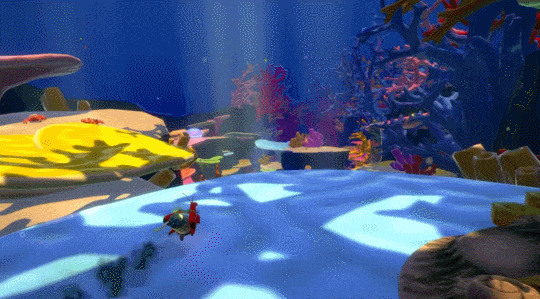
Another Crab's Treasure was a pretty fun soulslike with a fun and whacky world to explore and combat reminiscent of its genre's conventions. It wasn't soul-shatteringly difficult like some others in the genre, but it did have a good kick of difficulty to keep it interesting.
It wasn't the sort of game that I feel like ranting and raving about in my review, but it was pretty fun as an experience to sort of shut my brain off to. The visuals were cute and interesting, the world was fun to traverse, and the story was just enough to keep it from feeling hollow.
I kind of just wish it had something that gripped me that little bit more...
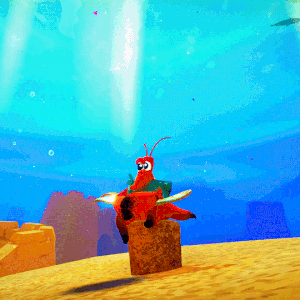
Rating Calculation
Story: 4/10
The story of Another Crab's Treasure was alright. It wasn't bad but it definitley wasn't anything that felt particularly worth putting any real emotional investment into. Don't get me wrong, it was fun to see what the cartoony antics of Kril and Co as we travelled around, collecting pieces of a treasure map, fighting venture capitalists and trying to save the world. But at the end of the day, it isn't the kind of thing you find yourself getting interested in to more than a surface level.
The messaging of anti-capitalism and the effects of pollution on our oceans and environments was neat! I have to say that, my uni degree is ecology, after all. I really do appreciate the messaging that Aggro Crab was presenting throughout the game.
The ending was... grim. Funny for a moment, but a little disappointing for having spent 15 hours leading up to it. The tool with which we could save the world magically is destroyed and unusable, the city is doomed to pollution and the people inside will all be infected and overrun with the gunk, and there's nothing we can do about it. We traverse the city, talk with a few NPCs as they celebrate the raining trash on the city, unaware of the danger they're in, and confront the prawn that stole our hermit crab's shell.
Then we kill him. No dramatic change of heart, no "I'm better than this, my friends taught me violence wasn't the way" (like the story had been building all throughout as a theme) we just... slash him across the chest and steal our shell without a word. The prawn dies, and we give the shell to a homeless hermit crab after we realise that, even though we thought we wanted it all along, we really don't care anymore.
It's a pretty bleak ending, something fitting I guess for the Soulslike genre, but nothing about it felt weighty enough to be truly satisfying in any way. I guess that's the point? I'm all for a bad ending, subverting expectations is great in fiction, but this felt a little cheap.
Character(s): 4/10
The main character Kril is a tired, frustrated hermit crab hellbent on getting his shell back from a loan shark that stole it as collateral for taxes he didn't know he owed to a government he didn't have any part in getting into power. He's pretty funny at times, the dialogue is full of little quips and jokes and plays at his naivety allthroughout the game.
The ensemble that follows him is forgettable at best and at times annoying at worst. I think in part this was intentional, as we embody Kril as our perspective. He did not and does not care about anyone around him, they were all just on the same path, and sometimes, like Firth, they were simply in the way of our goals. They weren't particularly memorable, I can only tell you about Firth and Roland by name from memory as they were pretty substantial enemies and eventual bosses to fight, but the rest entirely slip my mind.
Atmosphere: 6/10
The atmosphere in Another Crab's Treasure is one of it's strengths for sure. It manages to switch near seamlessly between cartoony fun and sudden grim-dark (well, as grim dark as a game about cartoon crabs can get) with ease. The jarring feeling it creates is intentional, as we're thrust headfirst into Kril's confusion and have to navigate it ourselves to find the answers to the questions it brings.
Colours and saturation is used often to achieve this, with the first stage starting out full of vibrant colour and then quickly switching to a desturatred grey junk-pit after we beat our first few bosses and watch the world fall into pollution. It's a very cool way to quickly convey just how dire the world's situation is.
Style/Graphics: 7/10
See my comments above for some points on styling :) The graphics of Another Crab's Treasure are smooth and fun, it's a very stylised game by nature, so nothing is remotely "realistic" but that's hardly what it was going for. It has the energy as a children's TV show , but with a little more weight behind it, letting itself be taken more seriously when necessary.
Sound Design: 5/10
The clanging and swishing of movement and the chittering of enemies was great, each move felt weighty and purposeful with its accompanying SFX. The music wasn't anything particularly special (I'll admit I got a little bored and spent most of my time playing music on Spotify instead) and the voice acting wasn't stellar but it wasn't bad by any means. Everything did it's job.
Mechanics: 8/10
The combat was fun! Really, that was the biggest highlight of the game, as it should be for any Soulslike. Rolling, parrying and outlasting enemies ten times my size was rewarding and learning the mechanics was enough to get me through without having to cheese enemies very often. There were a few bosses I'll admit I wasn't a fan of, (Pagurus, I'm looking at you) but for the most part, I enjoyed almost all the major fights and felt satisfied by the time I managed to put them in the ground.
Like other soulslikes Another Crab's Treasure does, however, deal with the problem of power creep as you approach the end of the game. Between the levels of experience, the added umami abilities, the moonsnails upgrades, and a better understanding of general mechanics, the last 5 or so bosses were incredibly easy compared to those at the beginning.
Once you learn to parry almost nothing is a match for you.
Performance/optimisation: 5/10
I had a few areas of the game, suddenly have frame drops and the game crashed a few times throughout my time with it. It wasn't often enough that I was overly frustrated, but the frame drops were at times near impossible to navigate until they passed. It was always in transition areas, which often had parkour, and it would send me hurtling off the map every time, often to my death and loss of substantial progress.
(4 + 4 + 6 + 7 + 5 + 8 + 5)/7 = 5.57 = 56/100
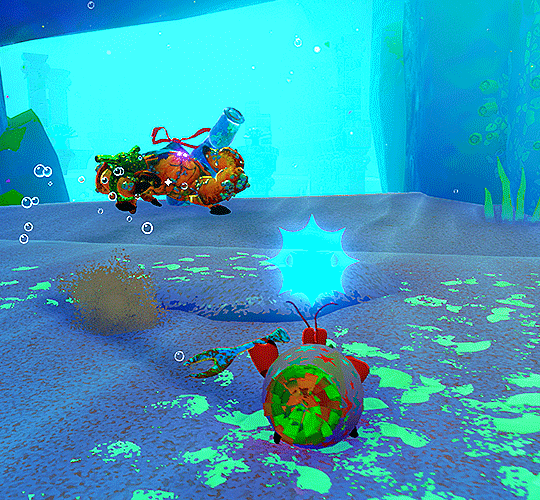
Date of completion: 15/04/2025
Genre: Souls-like
Time to beat: 15 hrs 3mins
Level of completion:m Main story + most side content
Trophies/Gamerscore: 700/100G 29/32
1-100 rating: 56%
Platform: PC/Xbox Gamepass
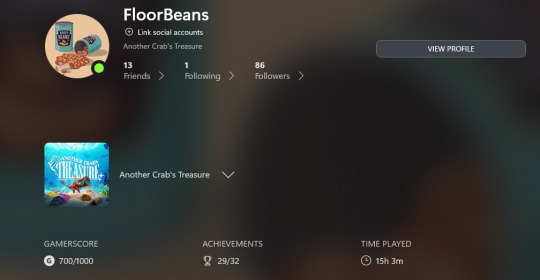
3 notes
·
View notes
Text
How Can Language Study Benefit Your Career and Life
Learning a new language can open doors to countless opportunities, both personally and professionally. Beyond the obvious benefits of improved communication skills, language study can enhance your cognitive abilities, cultural understanding, and career prospects.

Cognitive Benefits of Language Learning
Enhanced Memory: Learning a new language requires memorizing vocabulary, grammar rules, and pronunciation. This process can strengthen your memory and improve cognitive function.
Improved Problem-Solving Skills: Language learning challenges you to think critically and creatively, as you navigate new linguistic structures and cultural nuances.
Increased Attention Span: The mental effort required to learn a new language can help improve your focus and attention span.
Career Opportunities
Global Job Market: Proficiency in multiple languages can make you a valuable asset in today's globalized job market. Many multinational companies seek employees with language skills.
International Travel and Work: Language skills can open doors to international travel, study abroad programs, and work opportunities in foreign countries.
Intercultural Communication: Effective communication across cultures is essential for success in many fields. Language skills can help you build strong relationships with people from different backgrounds.
Personal and Cultural Benefits
Cultural Understanding: Learning a new language provides insight into the culture and history of the language's native speakers.
Enhanced Empathy: Understanding different cultures can foster empathy and tolerance.
Personal Growth: Learning a new language can boost your self-confidence and personal satisfaction.
Travel Experiences: Language skills can enrich your travel experiences, allowing you to connect with locals and immerse yourself in the culture.
Tips for Effective Language Learning
Set Realistic Goals: Break down your language learning goals into smaller, achievable steps.
Practice Regularly: Consistent practice is key to language learning success.
Immerse Yourself: Surround yourself with the language by watching movies, listening to music, and reading books in your target language.
Join a Language Study Group: Collaborating with other language learners can provide motivation and support.
Utilize Technology: Language learning apps and online platforms like Explain Learning can help you practice vocabulary, grammar, and pronunciation.
Explain Learning: Your Language Learning Partner
Explain Learning is an e-learning platform designed to support your language learning journey. Our platform offers a variety of resources and tools to help you:
Interactive Lessons: Engage with interactive exercises, quizzes, and video lessons.
Personalized Learning Paths: Create customized learning plans tailored to your goals and pace.
Language Exchange: Connect with native speakers and other language learners for conversation practice.
Community Forums: Discuss language-related topics and share experiences with other learners.
By combining effective study techniques, utilizing technology, and joining a language study group, you can achieve your language learning goals and unlock a world of opportunities.
Know more https://explainlearning.com/blog/language-study-career-life-benefits/
#language study#e-learning platform for Language Study#online Language Study#Language Study Group#Language Group#Explain Learning#Language learning
3 notes
·
View notes
Text
vimeo
VISUAL TALES Presents Actor IAN OUSLEY from NETFLIX’s AVATAR THE LAST AIRBENDER
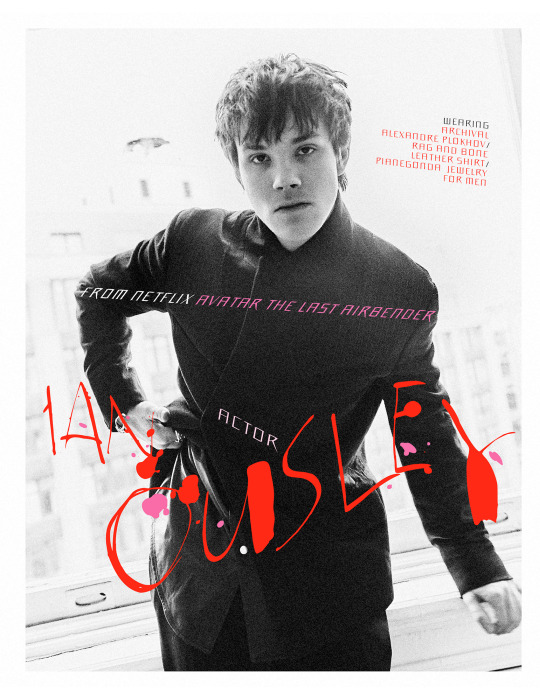
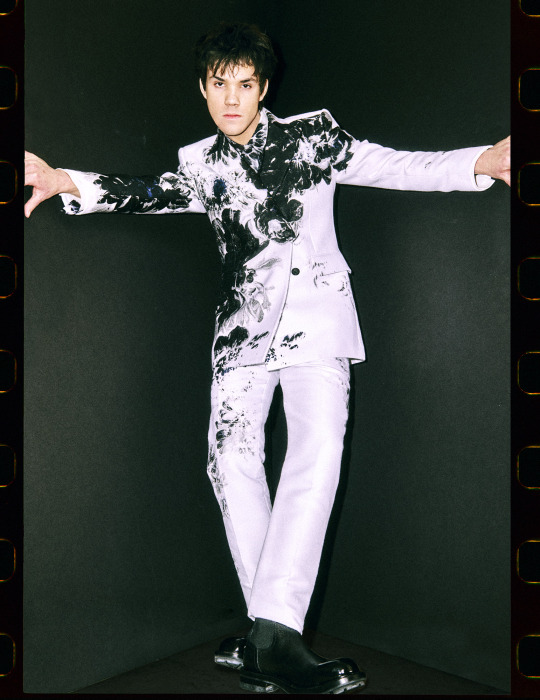


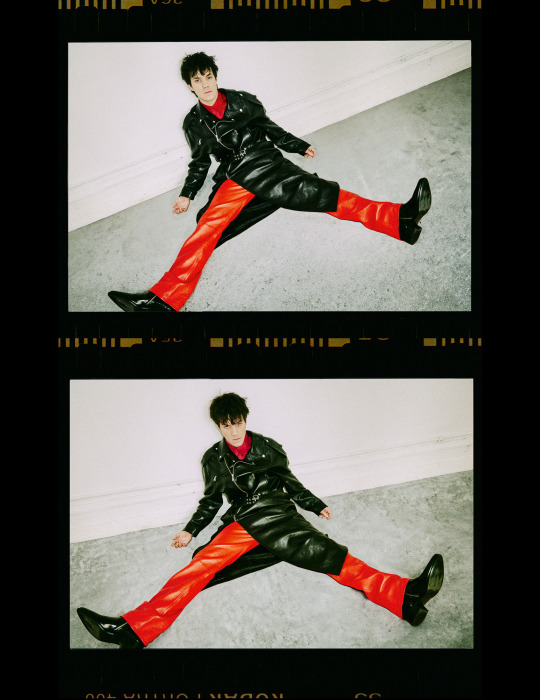
Best known for his portrayal of 'Sokka' in the latest hit Netflix series "Avatar: The Last Airbender," Ousley brings depth to the character's leadership struggles with a blend of wit and deadpan humor. As we delve beyond the screen, we uncover Ian's entrepreneurial spirit, co-founding the innovative clothing line KALÓ SOIL, a venture that repurposes vintage items into timeless fashion pieces. From winning championships to gracing the screens of Netflix's "13 Reasons Why" and CBS's "Young Sheldon," Ian Ousley's trajectory is as dynamic as the characters he embodies.
BIBI XIA: Hi fellow Texan! How was growing up in Texas and when did you move to LA? IAN OUSLEY: I love LA and have been here since 2016 when I was just 14 years old. I grew up in College Station, Texas, which as you know is a city built for college students. While most people come from Houston or Dallas for college, it’s a different town when you’re growing up in it. People who grew up there wanted to do team sports like football, but I took a very different path because of my asthma, and being in the grass was terrible for me. This led me to do Taekwondo at 8-9 years old because it was an indoor solo sport. School was very competitive and I knew I wanted to take a different path than going to college. So I took the non-traditional route of an indoor sport, noncompetitive with academics, and then transitioned into an artist career path here in LA.
BX: I’m sure you’ve been asked a lot of the same questions regarding Avatar, so something more specific I had in mind is if you could water bend in your everyday life, what would you use it for? IO: It’s a hard question to answer because in the show, they are at war, and it’s hard to think about applying it in everyday life. Water bending is cool because you can heal people with it. If I was one of the only water benders I’d probably go into medicine. Or, I can just become the most wealthy entrepreneur in the water slide business and open up Schlitterbahns left and right.
BX: What was your most memorable scene from the show and why? IO: I would say the most memorable scene as an audience would probably be the Avatar Kyoshi scene. I especially liked how she showed up when Katara and Zuko were fighting, and how she just appeared. What was yours? BX: Same! That scene was so memorable, that I hit replay as soon as it was over.
BX: Who is most like their character and who is least like their character and why? IO: I think Gordon is most like his character in real life, he’s just this very goofy and energetic kid off-screen. The least like their character is an easy answer because Zuko is this person consumed by power and anger, while Dallas in real life is an angel and a softie.
BX: Would you say you’re similar to Sokka? IO: I think there are a lot of similarities between me and Sokka. We both love humor and use it as a tool more than part of our personality. Luckily both my parents are still in my life and that does fundamentally change. Sokka lost both of his parents and has such a big responsibility to take care of a village. So we are different in that we went through different life experiences even though there are similarities.
BX: Do you find it more challenging to portray someone more similar to you or very opposite to who you are? IO: I prefer portraying a character that’s vastly different from my own personality. When you’re acting and you have different circumstances to portray that are further away from your own, you have the opportunity to really build out a character. I do a lot of prep before doing something, it’s important that the characters have their own physicalities, their own ways of reacting to things, and ground themselves. I’ve not had a role yet where those characteristics are similar to mine. It’s less vulnerable when you’re not being compared to your character in real life.

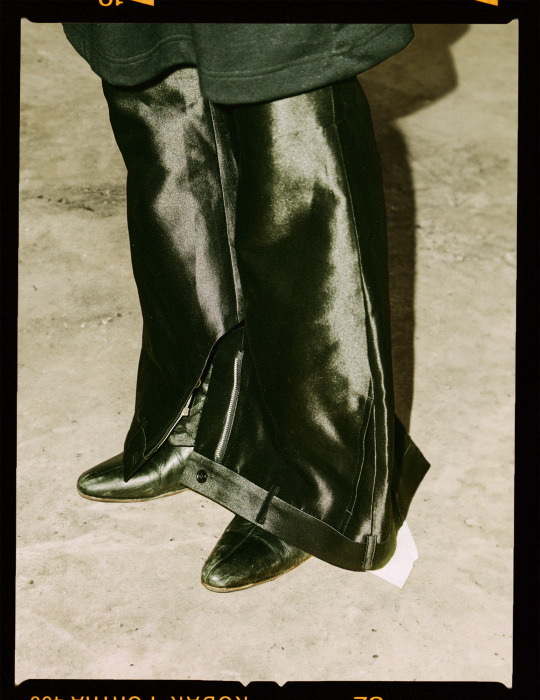





BX: Is there a role or character you’d like to play someday? IO: I’m really looking forward to playing a villain or something fantastical like a creature or motion capture. My number one role would be to play Beast Boy.
BX: Speaking of Beast Boy, how was the hair and makeup process on the set of Avatar? IO: I was so lucky, my process was fairly short. On Mondays, Wednesdays, and Fridays I get a haircut, and that was 30 minutes in hair and 30 minutes in makeup. On Tuesdays and Thursdays, it was only 15 minutes for hair, and all that was to center the ponytail. Most of the other cast members had a lot longer time like Dallas had spent at least 2 hours every day to get prosthetics for his character.
BX: What was your favorite costume and weapon on set? IO: Costume-wise, it’s definitely the warrior outfit with the chainmail and shoulder pads. Weapon-wise, I really liked the boomerangs and we had it made in various materials. I really liked the aluminum version and enjoyed playing around with it. I have a world championship in weapons for my martial arts. The war club I had was also really heavy on the top and light at the bottom so it was an interesting feel.
BX: What are you most looking forward to for Seasons 2 and 3? IO: I’m most looking forward to being back with the fam, my co-stars. There’s a different bond you create with people when you’re doing a project together and building a shoulder-to-shoulder interaction instead of face-to-face. We’re all focused on a goal and moving towards that thing, it feels almost like being in a team sport. I’m also looking forward to reading the scripts and specific scenes from the show and how they will mix and evolve the characters. I hope that they incorporate more humor for Sokka.
BX: You started a fashion brand with your friends, KALÓ SOIL. Can you tell us about the inspiration and process of creating the piece you wore to the premiere? IO: The inspiration behind this piece was white ravens. They’ve been a very important part of my life for the last year and a half. Ravens mean the provisions of God, and the concept of the white raven is a very glorious and triumphant raven. We were inspired by the layers and pleats that represented the raven and we used a lot of different textiles and textures for the piece. We had 7 crosses on the leather sashe and 7 represented the number for perfection.
BX: What’s next for KALÓ SOIL? IO: It’s been such a beautiful opportunity to work with my business partners. They are really amazing creatives in designing and creative directing. We’re starting to do collections and our goal is to do a runway this year.
BX: Do you have any upcoming projects? IO: I’m working on a short right now with director Tony Tanchney and we’re really excited about it but I can’t tell you too much about what it is. It’s very different from the characters I’ve done before, so it’s interesting to see the contrast. But after that, it will mostly be Avatar for the next two and a half years.
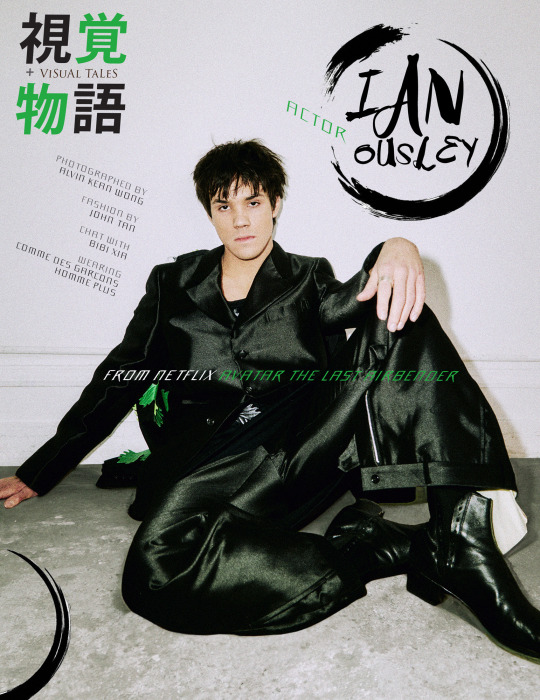
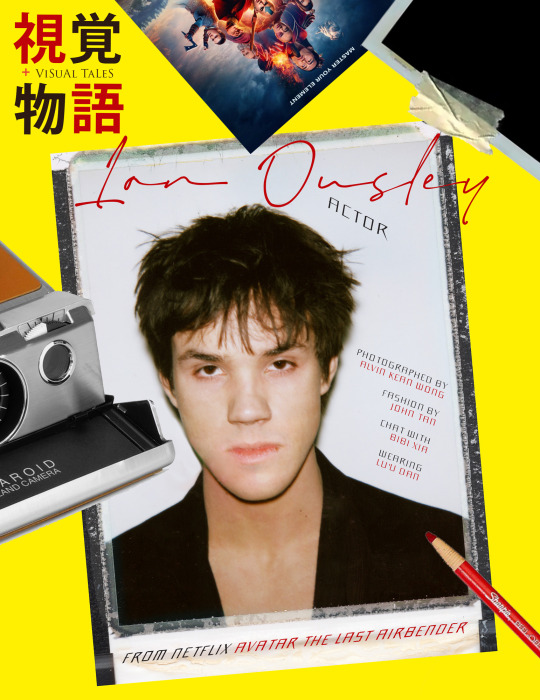
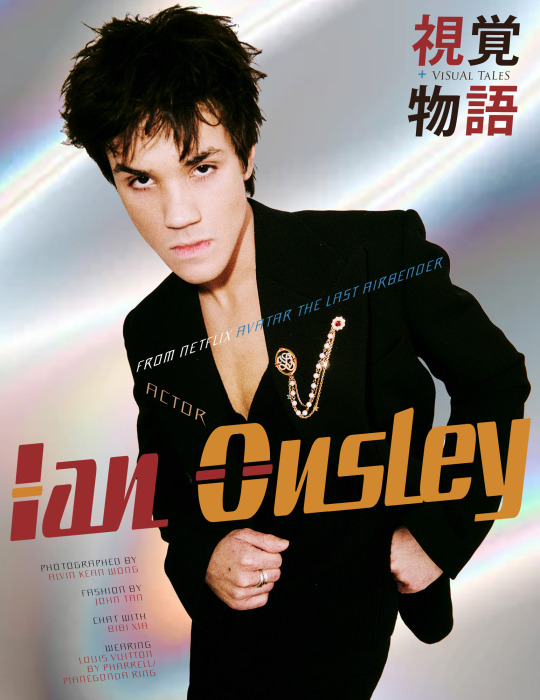
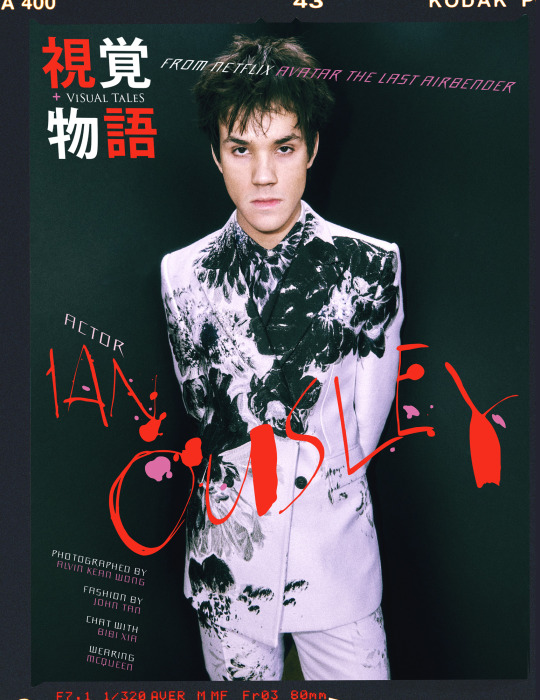
#Vimeo#natla#atla#netflix avatar#avatar the last airbender#avatar netflix#netflix atla#atla netflix#ian ousley#photoshoot#interview#visual tales
8 notes
·
View notes
Text
Exploring Data Science Tools: My Adventures with Python, R, and More
Welcome to my data science journey! In this blog post, I'm excited to take you on a captivating adventure through the world of data science tools. We'll explore the significance of choosing the right tools and how they've shaped my path in this thrilling field.
Choosing the right tools in data science is akin to a chef selecting the finest ingredients for a culinary masterpiece. Each tool has its unique flavor and purpose, and understanding their nuances is key to becoming a proficient data scientist.
I. The Quest for the Right Tool
My journey began with confusion and curiosity. The world of data science tools was vast and intimidating. I questioned which programming language would be my trusted companion on this expedition. The importance of selecting the right tool soon became evident.
I embarked on a research quest, delving deep into the features and capabilities of various tools. Python and R emerged as the frontrunners, each with its strengths and applications. These two contenders became the focus of my data science adventures.
II. Python: The Swiss Army Knife of Data Science
Python, often hailed as the Swiss Army Knife of data science, stood out for its versatility and widespread popularity. Its extensive library ecosystem, including NumPy for numerical computing, pandas for data manipulation, and Matplotlib for data visualization, made it a compelling choice.
My first experiences with Python were both thrilling and challenging. I dove into coding, faced syntax errors, and wrestled with data structures. But with each obstacle, I discovered new capabilities and expanded my skill set.

III. R: The Statistical Powerhouse
In the world of statistics, R shines as a powerhouse. Its statistical packages like dplyr for data manipulation and ggplot2 for data visualization are renowned for their efficacy. As I ventured into R, I found myself immersed in a world of statistical analysis and data exploration.
My journey with R included memorable encounters with data sets, where I unearthed hidden insights and crafted beautiful visualizations. The statistical prowess of R truly left an indelible mark on my data science adventure.
IV. Beyond Python and R: Exploring Specialized Tools
While Python and R were my primary companions, I couldn't resist exploring specialized tools and programming languages that catered to specific niches in data science. These tools offered unique features and advantages that added depth to my skill set.

For instance, tools like SQL allowed me to delve into database management and querying, while Scala opened doors to big data analytics. Each tool found its place in my toolkit, serving as a valuable asset in different scenarios.
V. The Learning Curve: Challenges and Rewards
The path I took wasn't without its share of difficulties. Learning Python, R, and specialized tools presented a steep learning curve. Debugging code, grasping complex algorithms, and troubleshooting errors were all part of the process.
However, these challenges brought about incredible rewards. With persistence and dedication, I overcame obstacles, gained a profound understanding of data science, and felt a growing sense of achievement and empowerment.
VI. Leveraging Python and R Together
One of the most exciting revelations in my journey was discovering the synergy between Python and R. These two languages, once considered competitors, complemented each other beautifully.

I began integrating Python and R seamlessly into my data science workflow. Python's data manipulation capabilities combined with R's statistical prowess proved to be a winning combination. Together, they enabled me to tackle diverse data science tasks effectively.
VII. Tips for Beginners
For fellow data science enthusiasts beginning their own journeys, I offer some valuable tips:
Embrace curiosity and stay open to learning.
Work on practical projects while engaging in frequent coding practice.
Explore data science courses and resources to enhance your skills.
Seek guidance from mentors and engage with the data science community.
Remember that the journey is continuous—there's always more to learn and discover.
My adventures with Python, R, and various data science tools have been transformative. I've learned that choosing the right tool for the job is crucial, but versatility and adaptability are equally important traits for a data scientist.
As I summarize my expedition, I emphasize the significance of selecting tools that align with your project requirements and objectives. Each tool has a unique role to play, and mastering them unlocks endless possibilities in the world of data science.
I encourage you to embark on your own tool exploration journey in data science. Embrace the challenges, relish the rewards, and remember that the adventure is ongoing. May your path in data science be as exhilarating and fulfilling as mine has been.
Happy data exploring!
22 notes
·
View notes
Text
How Independent Artists Can Succeed Without a Label Deal?

In the music industry, the traditional path to success often involved securing a record deal with a major label. However, the landscape has significantly changed, and today, independent artists have more opportunities than ever to succeed without the backing of a record label. Here are several strategies that independent artists can utilize to build their careers and achieve success on their own terms.
Leverage Digital PlatformsStreaming ServicesPlatforms like Spotify, Apple Music, and Amazon Music have revolutionized the way music is consumed. Independent artists can distribute their music directly to these services through distributors like TuneCore, DistroKid, and CD Baby. By getting their music onto these platforms, artists can reach a global audience and generate revenue from streams. Social MediaSocial media platforms such as Instagram, TikTok, Twitter, and Facebook allow artists to connect with fans directly. By regularly posting content, engaging with followers, and using targeted ads, artists can build a loyal fanbase. Viral challenges and trends, especially on TikTok, can propel a song to widespread recognition overnight. YouTubeYouTube remains a powerful tool for musicians. By creating music videos, lyric videos, and behind-the-scenes content, artists can attract and retain fans. Monetizing videos through ads and partnering with other creators can also provide additional income streams.
Build a Strong BrandUnique IdentityDeveloping a unique identity and brand is crucial. This includes everything from the artist & visual aesthetic and logo to their personal story and message. A strong brand helps artists stand out in a crowded market and makes them more memorable to listeners. Consistent ContentConsistency in content creation and release schedules helps maintain audience interest. Regularly releasing new music, videos, and engaging content keeps fans excited and invested in the artist’s journey.
Utilize Crowdfunding and Fan SupportCrowdfunding PlatformsPlatforms like Kickstarter, Patreon, and GoFundMe allow artists to raise funds directly from their fans. Crowdfunding can be used to finance albums, tours, music videos, and other projects. In return, artists can offer exclusive content, merchandise, or experiences. Fan EngagementBuilding a strong connection with fans is key. Engaging with fans through social media, live streams, and meet-and-greets helps create a loyal community. Fans who feel personally connected to an artist are more likely to support them financially and spread the word about their music.
Live Performances and TouringLocal GigsStarting with local gigs and gradually expanding to larger venues helps artists build a live performance reputation. Performing live not only generates income but also strengthens the bond with fans. Virtual ConcertsVirtual concerts and live-streamed performances have become increasingly popular. Platforms like Twitch and YouTube Live enable artists to perform for a global audience from the comfort of their home. Virtual concerts can be monetized through ticket sales, donations, and sponsorships.
Collaboration and NetworkingCollaborate with Other ArtistsCollaborating with other independent artists or influencers can help expand an artist���s reach. Collaborations introduce artists to new audiences and can result in creative synergies that enhance the music. Industry NetworkingBuilding relationships within the industry is important. Attending music conferences, workshops, and networking events can open doors to new opportunities, including collaborations, performances, and media coverage.
Smart Business ManagementFinancial PlanningIndependent artists need to manage their finances wisely. This includes budgeting for production costs, marketing, touring, and other expenses. Using financial tools and software can help keep track of income and expenses. Rights ManagementUnderstanding and managing music rights is crucial. This includes registering music with performance rights organizations (PROs) like ASCAP, BMI, or SESAC to ensure that royalties are collected whenever their music is played publicly.
Conclusion Succeeding as an independent artist requires a combination of creativity, business acumen, and strategic planning. By leveraging digital platforms, building a strong brand, engaging with fans, performing live, collaborating with others, and managing finances effectively, independent artists can carve out a successful career on their own terms. The music industry is evolving, and with the right approach, independent artists have the power to thrive without the need for a traditional record label deal.
Article Source: https://digzmediagroup.com/
#independentartist#musicindustry#makingmusic#musicbusiness#musicmarketing#musicpromotion#artistbranding#musicstreaming
2 notes
·
View notes